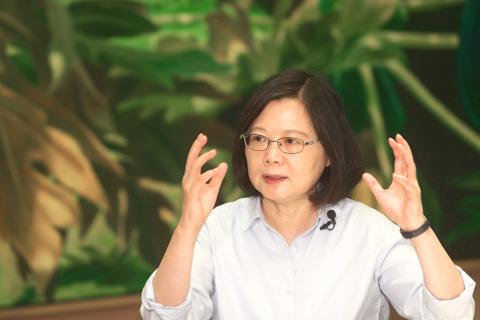President Tsai Ing-wen (蔡英文) on Sunday said that constitutional reform is a bottom-up undertaking that should not be initiated by the Democratic Progressive Party (DPP) without majority public participation.
“One political party by itself is not capable of carrying out such a huge task and we will explore the chances of holding dialogue with other political parties in the next phase,” Tsai said in an interview with the Central News Agency.
Tsai, who is also DPP chairperson, said at the party’s 17th national congress on Sept. 24 that the constitutional reform plan would include issues such as lowering the voting age to 18, codifying human rights and reforming the legislative election system to get rid of unequal vote values and inequitable representation.

Photo: CNA
Asked whether the reform should include a change to a Cabinet or fully presidential system of government, Tsai said she did not want to impose her personal views on the issue at this stage.
Constitutional reform is a task that should be tackled from the bottom to the top to allow participation by the majority of people, she said.
“Carrying out constitutional reform is like making a garment that must fit the person’s needs,” Tsai said. “It is important to have experienced people taking part in the discussions so that the reform will fit Taiwan’s current needs.”
Turning to the issue of the president giving a state of the nation address in the legislature, Tsai said she would not rule out becoming the first Taiwanese president to do so, if it was something the majority of people wanted.
The Additional Articles of the Constitution of the Republic of China states that the president can give a state of the nation address in the legislature.
Asked whether the timing of a constitutional reform referendum would be tied to the election cycle, Tsai said she was not thinking along those lines and that it would all depend on how the issue evolved.
Local government elections are to be held next year, while the presidential and legislative elections are due in 2020.
Addressing a controversy over recent comments by newly appointed Premier William Lai (賴清德), Tsai said Lai is fully aware of the government’s overall policy goals and understands very well “what the limits are.”
On Sept. 26, Lai said in his first report to the legislature that he was “a pragmatic supporter of Taiwanese independence.”
“The two sides of the Taiwan Strait are independent of each other, with Taiwan being an independent sovereign state whose official title is the Republic of China,” Lai said in response to lawmakers’ questions about his views on cross-strait issues.
His comments sparked a firestorm at home and drew attention in the international community, including in China and the US, prompting the Presidential Office to issue a statement that the government had not changed its cross-strait policy.
In a follow-up statement on Friday, Lai said that the president was responsible for cross-strait policy and that in his role as premier, he would adhere to Tsai’s policy of maintaining the “status quo” across the Taiwan Strait.

INVESTIGATION: The case is the latest instance of a DPP figure being implicated in an espionage network accused of allegedly leaking information to Chinese intelligence Democratic Progressive Party (DPP) member Ho Jen-chieh (何仁傑) was detained and held incommunicado yesterday on suspicion of spying for China during his tenure as assistant to then-minister of foreign affairs Joseph Wu (吳釗燮). The Taipei District Prosecutors’ Office said Ho was implicated during its investigation into alleged spying activities by former Presidential Office consultant Wu Shang-yu (吳尚雨). Prosecutors said there is reason to believe Ho breached the National Security Act (國家安全法) by leaking classified Ministry of Foreign Affairs information to Chinese intelligence. Following interrogation, prosecutors petitioned the Taipei District Court to detain Ho, citing concerns over potential collusion or tampering of evidence. The

‘FORM OF PROTEST’: The German Institute Taipei said it was ‘shocked’ to see Nazi symbolism used in connection with political aims as it condemned the incident Sung Chien-liang (宋建樑), who led efforts to recall Democratic Progressive Party (DPP) Legislator Lee Kun-cheng (李坤城), was released on bail of NT$80,000 yesterday amid an outcry over a Nazi armband he wore to questioning the night before. Sung arrived at the New Taipei City District Prosecutors’ Office for questioning in a recall petition forgery case on Tuesday night wearing a red armband bearing a swastika, carrying a copy of Adolf Hitler’s Mein Kampf and giving a Nazi salute. Sung left the building at 1:15am without the armband and apparently covering the book with a coat. This is a serious international scandal and Chinese

Seventy percent of middle and elementary schools now conduct English classes entirely in English, the Ministry of Education said, as it encourages schools nationwide to adopt this practice Minister of Education (MOE) Cheng Ying-yao (鄭英耀) is scheduled to present a report on the government’s bilingual education policy to the Legislative Yuan’s Education and Culture Committee today. The report would outline strategies aimed at expanding access to education, reducing regional disparities and improving talent cultivation. Implementation of bilingual education policies has varied across local governments, occasionally drawing public criticism. For example, some schools have required teachers of non-English subjects to pass English proficiency

TRADE: The premier pledged safeguards on ‘Made in Taiwan’ labeling, anti-dumping measures and stricter export controls to strengthen its position in trade talks Products labeled “made in Taiwan” must be genuinely made in Taiwan, Premier Cho Jung-tai (卓榮泰) said yesterday, vowing to enforce strict safeguards against “origin laundering” and initiate anti-dumping investigations to prevent China dumping its products in Taiwan. Cho made the remarks in a discussion session with representatives from industries in Kaohsiung. In response to the US government’s recent announcement of “reciprocal” tariffs on its trading partners, President William Lai (賴清德) and Cho last week began a series of consultations with industry leaders nationwide to gather feedback and address concerns. Taiwanese and US officials held a videoconference on Friday evening to discuss the